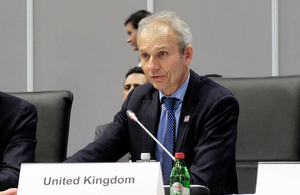UK statement at the Plenary Session of the 22nd OSCE Ministerial Council, 3 December 2015, Belgrade
Delivered by the Minister of Europe of the United Kingdom H.E. The Right Hon David Lidington MP

David Lidington delivers the UK statement at the 2015 OSCE Ministerial
Thank you, Mr. Chairman,
It is a pleasure to be in Belgrade. I would like to thank Prime Minister Vučić and our Serbian hosts for welcoming us so warmly. I also wish to commend you for the professionalism and dedication with which you and your team have handled another challenging year for the OSCE Chairmanship.
Since its beginnings in the Helsinki Final Act 40 years ago, the Conference, then Organisation for Security in Europe, has been defined by its comprehensive approach to security, stability and conflict prevention – underpinned by commitment to human rights and fundamental freedoms.
It is, Mr. Chairman, a fundamental pillar of the rules-based international order.
One year ago, this meeting was dominated by events in Ukraine that challenged the very principles and commitments upon which the OSCE is founded: Russia’s illegal annexation of Crimea, the downing of flight MH17 and the ongoing fighting in eastern Ukraine.
Twelve months on, Crimea is still under illegal annexation and, as reported by ODIHR and the High Commissioner for National Minorities, there is grave cause for concern about the deteriorating human rights situation.
In Eastern Ukraine the level of violence has reduced, thanks largely to OSCE efforts to support the Minsk Agreements – and the work of Ambassadors Tagliavini and Sajdik in the Trilateral Contact Group.
But the situation on the ground is fragile and we have seen an increase in fighting in November; the humanitarian situation remains dire; and millions remain displaced from their homes. Above all, restoration of Ukrainian sovereignty and territorial integrity, removal of all foreign armed troops and equipment, and full control of its own State borders is still not in sight.
The OSCE’s Special Monitoring Mission has a crucial role to play. The UK, with 24 British citizens currently serving as monitors, remains a strong supporter of the Mission – and supports early extension of its mandate beyond March 2016.
I commend Chief Monitor Apakan and his team for impressive work in the face of considerable challenges – including significant security threats and deliberate obstruction of staff and equipment. We are deeply concerned by this.
The Mission must have full, unfettered access to all areas of Ukraine, including on Ukraine’s border with Russia, in order to do the job that we, as OSCE member-states, have mandated them to do.
Mr. Chairman, resolving the conflict in eastern Ukraine is proving difficult – though the solution is clear. What is needed is genuine political will to restore Ukrainian sovereignty; to end the fear
and suffering of ordinary people in eastern Ukraine; and to allow the Ukrainian Government to focus on much needed programmes of governance and reform.
I therefore call on the Russian Federation to demonstrate such political will – by withdrawing their weapons and personnel, and using their considerable influence over the separatist leadership. This is the only way to bring an end to a crisis with substantial human as well as economic costs for the people of Ukraine and Russia.
Mr. Chairman, the situation in eastern Ukraine has changed perceptions of the value and relevance of the OSCE; and the OSCE has responded well. Events in and around Ukraine pose the bloodiest, most visible challenge to the Helsinki principles and other international commitments that the OSCE has faced.
Those principles and commitments must remain at the heart of our efforts to prevent eastern Ukraine becoming another protracted low-level conflict. And to make real progress in resolving other disputes that continue to blight the lives of many people elsewhere in the OSCE region.
It is right that this week – and in the coming year – we focus on the related and urgent challenges of updating politico-military Confidence and Security Building Measures. Not least updating the Vienna Document, as well as protecting fundamental freedoms. These core elements of OSCE business are fundamental to our purpose of building comprehensive and cooperative security across our region.
In this context it is right, too, that we address other pressing, relevant topical issues – issues where the OSCE has a role to play, alongside other international organisations: specifically terrorism and migration. In doing so, it is important that we keep our focus where the OSCE has a distinct role – and adds value by coordinating with and complementing other actors.
Mr. Chairman, I began by commending the Serbian Chair-in-Office. I conclude with my sincerest best wishes for the incoming German Chair and his team. And I look forward to working together as we tackle the significant challenges to security and cooperation in Europe that we are likely to face over the coming months.
Thank you, Mr. Chairman